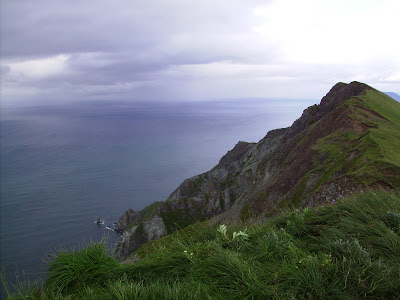

 It was interesting today seeing the differences between the brown and red king crabs. Our off-loading system is really pretty efficient compared to some on the island - there are a couple guys down in the hold of the ship loading the brailers and separating any crab that are dead (boats don't get paid for any dead crab). The crane operator swings the brailer over to a large stainless steel inclined ramp which opens directly into the plant where the crabs are grabbed by the waiting processing crew and butchered, cooked, chilled, glazed and packed. The photos above show F/V Aleutian No. 1, the unloader pulling the release on the brailer of crab, and the waiting processing crew grabbing the crab, butchering them, and handing the legs down the line for the next step.
It was interesting today seeing the differences between the brown and red king crabs. Our off-loading system is really pretty efficient compared to some on the island - there are a couple guys down in the hold of the ship loading the brailers and separating any crab that are dead (boats don't get paid for any dead crab). The crane operator swings the brailer over to a large stainless steel inclined ramp which opens directly into the plant where the crabs are grabbed by the waiting processing crew and butchered, cooked, chilled, glazed and packed. The photos above show F/V Aleutian No. 1, the unloader pulling the release on the brailer of crab, and the waiting processing crew grabbing the crab, butchering them, and handing the legs down the line for the next step.I start my new job in the Engineering department Monday so I'll be hanging up my rain gear and joining the white collar ranks. I've never worked with a finer bunch of coworkers than the ones on the line with me the last three months - Haime, Boy, Phillip, Edde, and Chayo - I'll miss you guys and will be back to visit. Cheers . . . . .














































